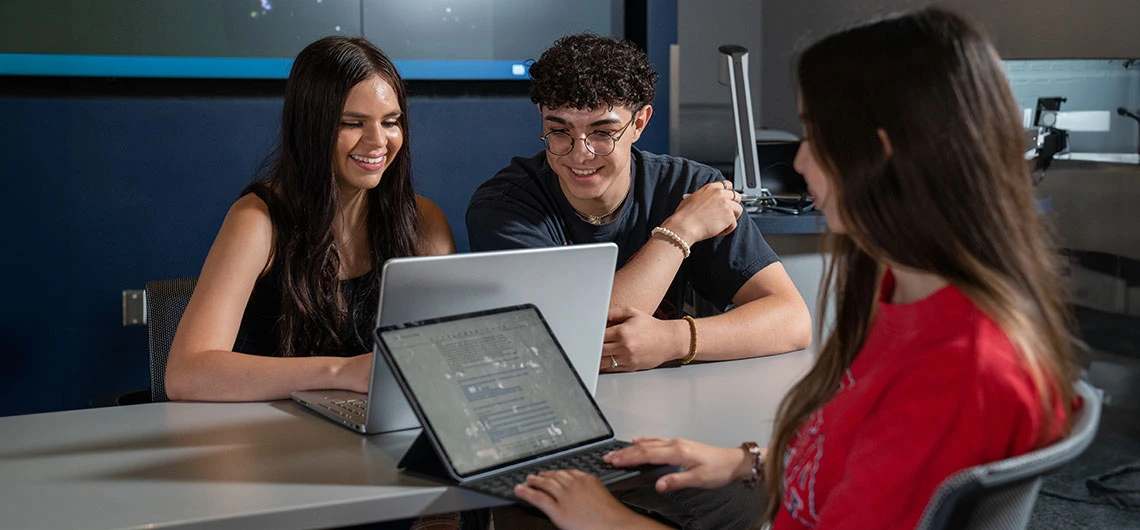
Undergraduate capstone projects in the College of Information Science provide an opportunity for students to showcase what they have mastered in their program.
The capstone project is a culminating experience for majors involving a substantive project that demonstrates a synthesis of learning accumulated in the major, including broadly comprehensive knowledge of the discipline and its methodologies.
Recent Capstone Projects Across InfoSci Degrees
View recent College of Information Science undergraduate capstone projects in software, research and games completed by student teams:
| CAPSTONE PROJECT | CATEGORY |
|---|---|
Pocket Tutor Team: Kohichiro Yamada, Jasmine Adelberg, Daniel Donahue, Taaon Frasor Keywords: Math Education, Error Detection, OCR | Software Capstone Award Winner |
BlendBud Team: Bailie Wynbelt, Erin Berridge, Huy Tran, Jessica Shaffer Keywords: Wine Recommendations, User Preferences, Community | Software |
FashionFolio Team: Tyler Kimball, Brandon Lopez, Rafi Leviton, Fernando Jaime, Lucas Dicochea Keywords: Market Research, Sustainability, Consumer Behavior | Software |
Life Lingo Frames Team: Alyssa Woods, Navneeth Kunkatla, Isaiah Valle, Peidong Wei, Trayvion White-Austin Keywords: Language Learning, Translation, Personalized Learning | Software |
Narrative Nest Team: Suryashree Ray, Victoria Torreno, Nishant Athawale, Ariel Garcia-Duarte Keywords: Writing Platform, Collaboration, AI, Storytelling | Software |
ReeldIn: Making Movies Matter Team: Jonathan Houge, Cooper Harris, Elizabeth Hong, Julius Ramirez, Farrah Rodriguez Keywords: Movie Selection, User Preferences, Curation | Software |
UA Course Compass Team: News Abusaada, Kargi Chauhan, Anushka Bande, Evan Williams, Rachel Stinnett Keywords: Course Planning, Data Mining, Machine Learning, Career Goals | Software |
Analyzing Environmental Factors for Foodborne Illness and Recall Prediction Team: Janessa Davis, Nicholas Filiberti, Alex Alonso, Khusniddin Abdullaev, Xiunan Song Keywords: Foodborne Illness, Machine Learning, Climate Change, Data Analysis | Research Capstone Award Winner |
Digital Literacy Research Team: Cami Corpus, Andrew Robbins, Connor Willihnganz, Amad Arshard, Peter Habib Keywords: Digital Literacy, Social Media, Polarization, Elections, Gen Z | Research |
NSF Robotics Analysis Team: Andrew Braunreiter, Jimena Sotelo, Adam White, Robert Cohen, Drake Bennington Keywords: Robotics, Research Trends, Data Analysis, NSF | Research |
Online Gaming Wellbeing Team: Eduardo Acuna-Arizmendi, Erick Lopez, Eddie Ekpoh, Ana Zenea Keywords: Gaming, Community, Toxicity, Wellbeing | Research |
Fight or Flake Team: Brian Baer, Koby Kreese, Jeffrey Teller, Christine Tran, Ashwin Vivek Keywords: Rhythm Game, Music, Immersion, Interactive | Games Capstone Award Winner |
Home by 10 Team: Samantha Jackson, Cory Froehlich, Kiel McDonald, Jose Rocha, Saul Murillo Keywords: Side-Scroller, Story-Based, Halloween, Mystery | Games |
The Strong Survive Team: Ryan Demler, Jonathan Trinh, Nicholas Skophammer Keywords: 3D Adventure, Survival, Open-World, Customization | Games |
Sustaining Wayville Team: Lydia Dufek, Jack Richardson, Zay Williams Keywords: Sustainability, 2D Game, Environmental, Adventure | Games |

